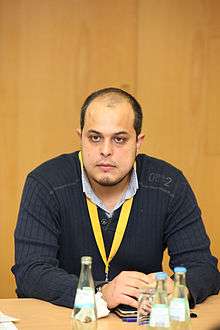Mohamed Ibrahim Mostafa
| Mohamed Ibrahim Mostafa محمد إبراهيم مصطفى | |
|---|---|
 | |
| Born |
July 2, 1979 Alexandria, Egypt |
| Residence | London, UK |
| Nationality | Egyptian |
| Education |
Ain Shams University (B.Eng.) University of Nottingham (M.Sc.) |
| Occupation |
CRM Practice Lead KPMG Internet Activist IT consultant |
| Employer | KPMG |
Mohamed Ibrahim Mostafa (Arabic: محمد إبراهيم مصطفى, other transliterations include: Mohammad, Muhammad, Ibraheem, Mustafa, Mustapha) (born 2 July 1979) is an Egyptian Internet activist and IT consultant with an interest in political reform, human rights, and social media. Mohamed Ibrahim ran the international arm of the "We are all Khaled Said" campaign. The campaign was in support of Khaled Said's case, a young Egyptian man who was killed by two Egyptian police officers in his home town Alexandria, Egypt. Khaled Said later became a symbol in the Egyptian Revolution of 2011. Mohamed Ibrahim focused his efforts on rallying international supporters and coordinating with activists worldwide to support Egyptians struggle for freedom, end of police brutality and dictatorship using his English Facebook page "We are all khaled Said" and the English Website of the campaign. Mohamed Ibrahim was part of the 25 January protests preparation (which later became the Egyptian Revolution of 2011) and was a focal point for spreading awareness to the international community and international media during the revolution and afterwards.[1]
Background
Mohamed Ibrahim was born on 2 July 1979 in Alexandria, Egypt and grew up in Cairo Egypt. His father was an Egyptian Army General and his mother is an accountant. At the age of 22, he moved to London, United Kingdom. He currently resides there.[2]
He earned a B.Eng. from Ain Shams University in 2001 and a M.Sc. in Software Engineering from the University of Nottingham in 2003.[2]
Career
Mohamed's career to date has included working as a senior consultant at a multinational consultancy and software development manager for a UK-based software house.[2]
Involvement in the Egyptian Revolution of 2011
In 2010, Mohamed Ibrahim founded the English Facebook page "we are all Khaled Said" few days after the death of Khaled Said,the young Egyptian who was tortured to death by Egyptian police in Alexandria. Mohamed Ibrahim worked with Wael Ghonim, the founder of the Arabic Facebook page "We are all Khaled Said", and formed up the "We are all Khaled Said" movement with the two Facebook Arabic and English pages. The movement co-ordinated with other Egyptian Activists and called for the 25 January protests all over Egypt which later became Egyptian Revolution of 2011.[3] He co-ordinated his work with other activists inside and outside Egypt and did interviews with international media about the revolution. He did interviews with the Morning Radio show, BBC Radio 5, Channel Four news, DW World[4] and several other international media outlets.
Prizes
- Best Social Activism Campaign [5] at the Deutsche Welle Global Media Forum 2011 and presented to him by Conny Czymoch.[6]
Events and Public Speaking
References
- ↑ (www.dw.com), Deutsche Welle. "Ibrahim, Mohamed | Speakers | DW | 24.05.2011". DW.COM. Retrieved 2017-11-30.
- 1 2 3 http://uk.linkedin.com/pub/mohamed-ibrahim-mostafa/8/451/267
- ↑ "Masrawy Home Page". مصراوي.كوم (in Arabic). Retrieved 2017-11-30.
- ↑ (www.dw.com), Deutsche Welle. "ما الذي دفعني لإنشاء مدوَّنتي على الإنترنت؟ شباب التغيير يتحدث | ثقافة ومجتمع | DW | 22.06.2011". DW.COM (in Arabic). Retrieved 2017-11-30.
- 1 2 "The Bobs - Best of Online Activism". thebobs.dw-world.de. Retrieved 2017-11-30.
- 1 2 "Flickr". Flickr. Retrieved 2017-11-30.
- ↑ "Hellkonferansen – Mohamed Ibrahim". Bente Haarstad Photography. 2012-02-05. Retrieved 2017-11-30.
- ↑ "Egyptian revolution - Mohamed Ibrahim - Images | Bente Haarstad Photography". bentehaarstad.photoshelter.com. Retrieved 2017-11-30.
- ↑ "Sosiale medier som maktmiddel". Hellkonferansen (in Norwegian Bokmål). Retrieved 2017-11-30.